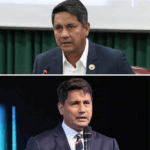Richard Gomez Issues Public Apology to Journalists After Controversial “Media Spin” Post
In the often-tense intersection between politics and media, words and actions can escalate into national controversies almost overnight. This was the case for actor-turned-legislator Richard Gomez, representative of the 4th District of Leyte, when a social media post he published last week drew backlash from journalists, press organizations, and netizens.
On September 2, 2025, Gomez stood on the House floor and delivered a public apology to the media, after facing criticism for posting screenshots of private text messages from reporters and labeling their attempts to seek his comment as part of a “media spin.” His apology, though accepted by some, has sparked larger conversations about press freedom, accountability, and the responsibilities of public officials in the digital age.

The Origins of the Controversy
The controversy began when Gomez, a well-known figure in both show business and politics, took to Facebook to address stories surrounding an infrastructure project in his district—specifically, a flood-control project in Matag-ob, Leyte.
Several news outlets had reported that the project was allegedly incomplete, raising concerns among local residents and watchdogs. Journalists reached out to Gomez to obtain his side of the story. Instead of responding directly, he posted screenshots of their messages on his personal Facebook page.
What made the post particularly problematic was that it included the names and contact numbers of several journalists. In the caption, Gomez dismissed the inquiries as “media spin,” implying that the press was attempting to sensationalize the issue.
The post quickly went viral, not only for its dismissive tone but also because it exposed reporters’ private information to the public.
Backlash from Journalists and Press Organizations
Almost immediately, the National Union of Journalists of the Philippines (NUJP) condemned Gomez’s actions. In a strongly worded statement, the organization described the post as both “irresponsible and dangerous,” pointing out that sharing the personal numbers of journalists could expose them to harassment, spam, or even physical threats.
Other press freedom advocates echoed the concern. Some noted that while politicians often feel frustrated by critical reporting, targeting the media in this manner undermines democratic accountability.
“Public officials should welcome scrutiny, not attack those doing their jobs,” one media ethics professor explained in an interview. “When an elected official publishes the personal information of journalists, it crosses the line between defending one’s reputation and endangering others.”
Richard Gomez’s Apology in Congress
Confronted by mounting criticism, Gomez used his time on the House floor during a privilege speech on September 2 to directly address the issue.
In a calm but somber tone, he admitted his misstep:
“To the members of the press who took offense in my social media post, I sincerely apologize. Sensitive information has been removed. I understand that the media endeavors to get my side of the story. I acknowledge your efforts. I am sorry and I could have handled it better.”
Following his apology, he confirmed that the original Facebook post had been edited to remove the screenshots with private details. While some journalists accepted the apology, others argued that the damage had already been done, as the personal information had already circulated online.
His Defense of the Flood-Control Project
Beyond the apology, Gomez also took the opportunity to clarify the issue that sparked the dispute in the first place: the flood-control project.
He explained that the project remained unfinished and therefore could not yet be judged as a failure. He further argued that it did not require an “occupancy permit,” as some critics had suggested, but rather a certificate of non-coverage from the Department of Environment and Natural Resources (DENR). This certificate, he said, had already been issued in September 2024 through the Department of Public Works and Highways (DPWH).
Gomez emphasized that the allegations surrounding the project were misleading. He invited both journalists and citizens to inspect the projects completed under his watch and assured the public that if any wrongdoing were proven, he would face it directly.
The Broader Issue: Politicians and the Press
The Gomez episode highlights a recurring tension in Philippine society: the delicate relationship between politicians and the media.
Journalists serve as watchdogs, tasked with scrutinizing public officials and holding them accountable. Politicians, meanwhile, often feel targeted by critical reporting, particularly when stories question the effectiveness of their projects or the use of public funds.
In Gomez’s case, his frustration with the media inquiries boiled over into a social media post that, whether intentional or not, endangered journalists by exposing their personal information. The backlash underscores the principle that public figures, especially elected officials, must exercise greater restraint online, where a single post can reach thousands within minutes.
Reactions from Netizens and the Public
Public reaction to Gomez’s apology has been mixed. On one hand, many applauded him for taking responsibility and issuing a public statement, noting that apologies from politicians are often rare. Supporters argued that he was right to call out what he perceived as unfair reporting, though they conceded that his method was inappropriate.
On the other hand, critics remained skeptical, arguing that the apology was “too little, too late.” Some netizens demanded a formal assurance that similar incidents would not happen again. Others highlighted that the incident reflects a broader culture of hostility toward journalists, especially when they report on issues of accountability and governance.
Lessons and Implications
The incident offers several key takeaways:
The Importance of Data Privacy – Publishing private contact details of individuals without consent, especially journalists, violates ethical and possibly legal standards. Public officials must be mindful of this responsibility.
The Role of Social Media – While platforms like Facebook allow politicians to communicate directly with their constituents, they also amplify mistakes. A single post can spiral into controversy and damage reputations.
Accountability in Politics – Gomez’s decision to apologize publicly is a step toward accountability. However, true accountability will also depend on whether his district’s infrastructure projects meet their promised goals.
Press Freedom in the Philippines – The incident reignites debates about the safety of journalists, who often face harassment both online and offline. Advocates argue that politicians should protect, not endanger, the press.
Conclusion: A Moment of Reflection
Richard Gomez’s apology may not erase the controversy, but it provides a rare moment where a politician openly admits fault in front of the public. For journalists, the episode is both a reminder of the risks they face and a validation of their crucial role in questioning those in power.
For Gomez, the challenge now is to move beyond damage control and focus on transparency, ensuring that the projects under his leadership truly serve the people of Leyte. For the country, the incident is yet another example of how fragile—but essential—the relationship between politicians and the press remains.
As the Philippines continues to navigate its democratic journey, both sides must find ways to engage constructively, without crossing ethical boundaries. In the end, a healthy democracy depends not only on the accountability of politicians but also on the protection of those whose job is to hold them accountable.
News
🔥 Jenny Miller’s shocking skincare disaster left her face peeling — but her secret comeback will leave you speechless! 👀✨
Jenny Miller’s Skincare Disaster: How a K-Beauty Routine Left Her Skin Peeling — and the Lessons She Wants You to…
🔥 Kathryn Bernardo and James Reid’s first-ever teleserye pairing shocks fans — an unexpected duo set to change Philippine TV forever! 🔥
Kathryn Bernardo and James Reid: A Groundbreaking Primetime Pairing That Has Fans Buzzing In the ever-evolving landscape of Philippine entertainment,…
🚨 Dingdong Bahan’s new car submerged in floods — heartbreak, anger, and a mystery that could change everything! 🚨
Dingdong Bahan’s New Car Submerged in Floodwaters: A Personal Frustration Reflecting a Larger Problem When heavy rains struck Metro Manila…
🌟 Marian Rivera wins FAMAS, teases fans with “Secret!” — is a new groundbreaking film or surprise project coming soon? 🌟
Marian Rivera’s FAMAS Triumph: The Lasting Legacy of Balota and a Glimpse Into the Megastar’s Journey A Victory Dedicated to…
🌟 Sharon Cuneta vanishes from social media — fans ask: rest or hidden reason? Her comeback will shock everyone! 🌟
Sharon Cuneta Takes a Break from Social Media to Focus on Rest and Self-Care August 30, 2025 – Manila, Philippines….
Neil Arce defends Gela Alonte: Is she victim of unfair privilege attacks or proof that hard work beats family name?
Neil Arce Defends Gela Alonte: A Call for Fair Judgment in the Age of Social Media Scrutiny In the digital…
End of content
No more pages to load












